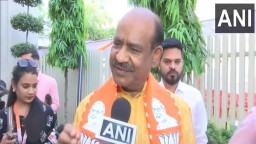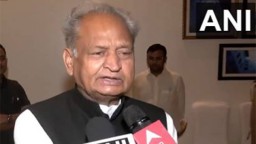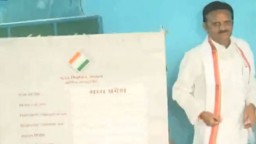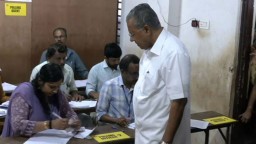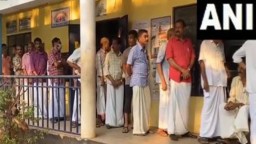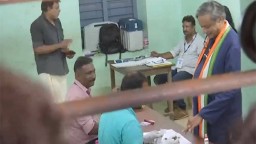NaMo REFLECTION OF PEOPLE’S TRUST

BRINGING GRIEVANCE REDRESSAL AT THE DOORSTEP! - AK SHARMA, UP Minister and Former Bureaucrat (Gujarat)
"I can never be limited by the restrictions of my chair. I remain among the people and will be there for them,” said PM Modi when he was the CM of Gujarat and launched SWAGAT. Internationally acclaimed, technologically robust, SWAGAT has been a boon in the domain of public service as it stands by the idea of “Ease of Living and Reach of Governance”. SWAGAT stands for Statewide Attention on Grievances by Application of Technology and recently PM Modi addressed a program marking 20 successful years of completion of this portal dedicated to public service.
We started the SWAGAT scheme in Gujarat in April 2003 in which we would convene a meeting every month with the citizens and address all their complaints. We created the SWAGAT portal in order to address public grievances through the use of technology. It was a first-of-its-kind initiative where the power of technology was harnessed to help the public. Modiji has always believed that “Governance happens through innovations, new ideas.” Top brass of the state had access to this portal. The Commissioners, the SPs, all the Secretaries and other senior officials could go into the system and the expectation from them was that they would resolve all the grievances and complaints that reached their respective offices. Not just this, this portal worked at four levels: State, District, Taluka and Gram. All departments at all the levels had the liberty to keep track of their accounts and to fast-track the redressal of grievances.
This portal served as a means to bring together the various smaller components of the larger system and this resulted in at least 75% of the complaints being addressed and resolved instantly by concerned officials within respective departments itself. About 25% of these complaints were marked and presented in the program where the CM was invited. These grievances we demarcated for the CM who always attended to them on the fourth Thursday of every month. We also arranged for an interaction of the complainant with the CM. As SWAGAT witnessed record success, several states tried to emulate this grievance redressal system and implemented it. UN awarded the CMO with the United Nations Public Service Award in 2010 for adopting this state wide attention on grievances. The system was recognized for improving quality, transparency, accountability and responsiveness in public service. When it comes to people-centric governance, there can be no better example than SWAGAT!
“Is it possible that a handicapped applicant sits on the floor while I remain seated in my chair?” - CHANDRESH KOTAK, Deputy Director, Sardar Patel Institute of Public Administration, Gujarat
SWAGAT is a unique program where Modiji used technology to address public grievances online and we received hundred percent success in this. Once an applicant had come and he said to the CM, “Sir, my job is not getting done despite repeated requests. And this senior official who is sitting there, he has been demanding money from me.” Modiji very coolly said, “Don’t worry! Zoom out the photo and show me the face of the official who is harassing you.” The complainant did that and told him that this is the Class 1 officer who has asked me for 1 lakh bribe. Immediately Modi saheb connected with the officer and asked him “Why are you doing this to people? You have a job and you are getting a salary. Then why are you demanding bribe? You must get his job done as fast as you can.”
Modiji’s handling of situations was so astute and effective that neither did the officer feel humiliated nor did the complainant return empty-handed. The officer never felt that he was insulted in front of so many people because Modiji’s goal was not to teach him a lesson, it was to help him move onto the path of righteousness and improve the way public service is conducted in the state. So only when the officer was transferred, he got to know about the reactions of Modiji.
Another incident is of the time when a handicapped person had lodged a grievance for not getting help and he was part of the meeting with the CM. He was not able to walk and he was sitting on the floor when Modi saheb arrived. As soon as he saw him sitting on the floor, Modiji ordered all of us to help him be seated in a chair. He said, “It is impossible that I should be sitting in a chair and the applicant on the floor.” After the program got over, he issued a standing order to always make prior arrangement for wheelchairs whenever we had physically challenged complainants on our list. Not just this, he also instructed us to never, ever let a handicapped complainant enter the premises without someone receiving him at the entrance. He said “The person has already arrived for the meeting after going through so much. Once he is here, it is your duty to go and greet him outside and bring him inside with honour and dignity. He should be heard with respect, his problem should be resolved utmost alacrity.”
At another time, a farmer had come and was demanding a compensation for the crop that had got wasted. Now all of us knew that Modi saheb will resolve his problem. But no one could have ever imagined the way Modi saheb was going to deal with this complaint. Modiji asked the farmer “What is the method of irrigation that you have adopted?” He said “Sir, we either take water from the canal that is flowing next to our fields or we depend on rains.” Modiji then asked him “Why don’t you use drip irrigation (tapak sinchai) for your fields?” And he then explained the benefits of drip irrigation to the farmer. So Modiji did not only address the grievances, but also empowered people with knowledge of best practices and guided them like a mentor. This is the hallmark of truly great leaders.
TO BE CONTINUED...
COMPILED AND EDITED BY SHASHIKANT SHARMA AND SHWETA SHARMA




.png)
.png)
.png)
.png)
.png)
.png)



